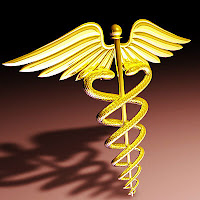This week saw an impassioned email debate in the School on whether we should instigate the practice of asking our students to make a pledge at their Graduation Ceremony. The suggestion originated at a graduation Ceremony two years ago, but was not taken forward because of the ‘Pledge’ contained in the last UK Prime Ministers Review of Nursing and Midwifery (The Front Line). In preparation for this year’s ceremony I was asked to raise within the School the possibility of our graduating students using the Declaration of Geneva as their prledge at the point of graduating.
It was way back in 1948 that the General Assembly of the World Medical Association adopted the Declaration of Geneva. Despite the wording being amended many times since then (the last being in 2006) it remains to many (within and without the medical profession) an anachronism. In its current form it reads as follows:
At the time of being admitted as a member of the medical profession:
• I solemnly pledge to consecrate my life to the service of humanity;
• I will give to my teachers the respect and gratitude that is their due;
• I will practice my profession with conscience and dignity;
• The health of my patient will be my first consideration;
• I will respect the secrets that are confided in me, even after the patient has died;
• I will maintain by all the means in my power, the honour and the noble traditions of the medical profession;
• My colleagues will be my sisters and brothers;
• I will not permit considerations of age, disease or disability, creed, ethnic origin, gender, nationality, political affiliation, race, sexual orientation, social standing or any other factor to intervene between my duty and my patient;
• I will maintain the utmost respect for human life;
• I will not use my medical knowledge to violate human rights and civil liberties, even under threat;
• I make these promises solemnly, freely and upon my honour.
Even for the medical profession, one can argue there are major problems in the terminology used and how the concepts these words reflect are incongruent with modern values and ethics. When I put this version up on the screen at our last School Development Day, I was (quite rightly) verbally shot down in a fusillade of emotionality.
This week’s debate was both on whether we needed to make a pledge at all (graduating students will already be bound in practice by the NMC Code of Conduct, the law and their moral duty not to harm patients), and if so what would it look like. The general consensus from colleagues and students (albeit a small number from those likely to graduate in 2011) was that a pledge was inappropriate and there were other ways to increase the significance of the ceremony for students, colleagues and the families who attend to celebrate the students success.
Last year, our Chancellor, Irene Khan, asked the students to keep their caps off until they had thanked their family and friends for supporting them over the course of their programme. The students also gave the staff a standing ovation. Many colleagues agreed that this approach had an authenticity to it that no pledge could match.
And of course this week also saw the wedding of Prince William and Kate Middleton. Being an unashamed royalist I of course every moment of the day, and could be found for long periods, sipping champagne in front of the television marvelling in the day as it unfolded. It was a fantastic spectacle and people all over the world witnessed the couple making their own special pledge to each other.
Strangely however, I was particularly captured by the trees used to decorate Westminster Abbey. Six field maples and two hornbeams, all of which were nearly 20ft tall were installed at the Abbey. These trees were English, natural, seasonal, ethical. The field maple symbolises humility and reserve, and was used to make loving cups in medieval times, while the hornbeam signifies resilience. I wish the happy couple well.
This long weekend is also remarkably different for me from the one I spent last weekend. Last weekend was spent at 33000 feet in the air travelling back to Manchester. This weekend like many British people I have stayed at home. What some have called ‘staycations’ – last year this meant people who stayed in the UK to holiday rather than travel abroad, this year, it means ‘camping in your own back yard’. So this weekend, I’ve stocked up with refreshing summer drinks and BBQ food, and have stayed at home and played with my big boys toys in the garden. The result is a garden that has its perfectly stark symmetrical lines once again restored against a backcloth of the irregularity and chaos of shape and colour that Mother Nature gives to the world.











































